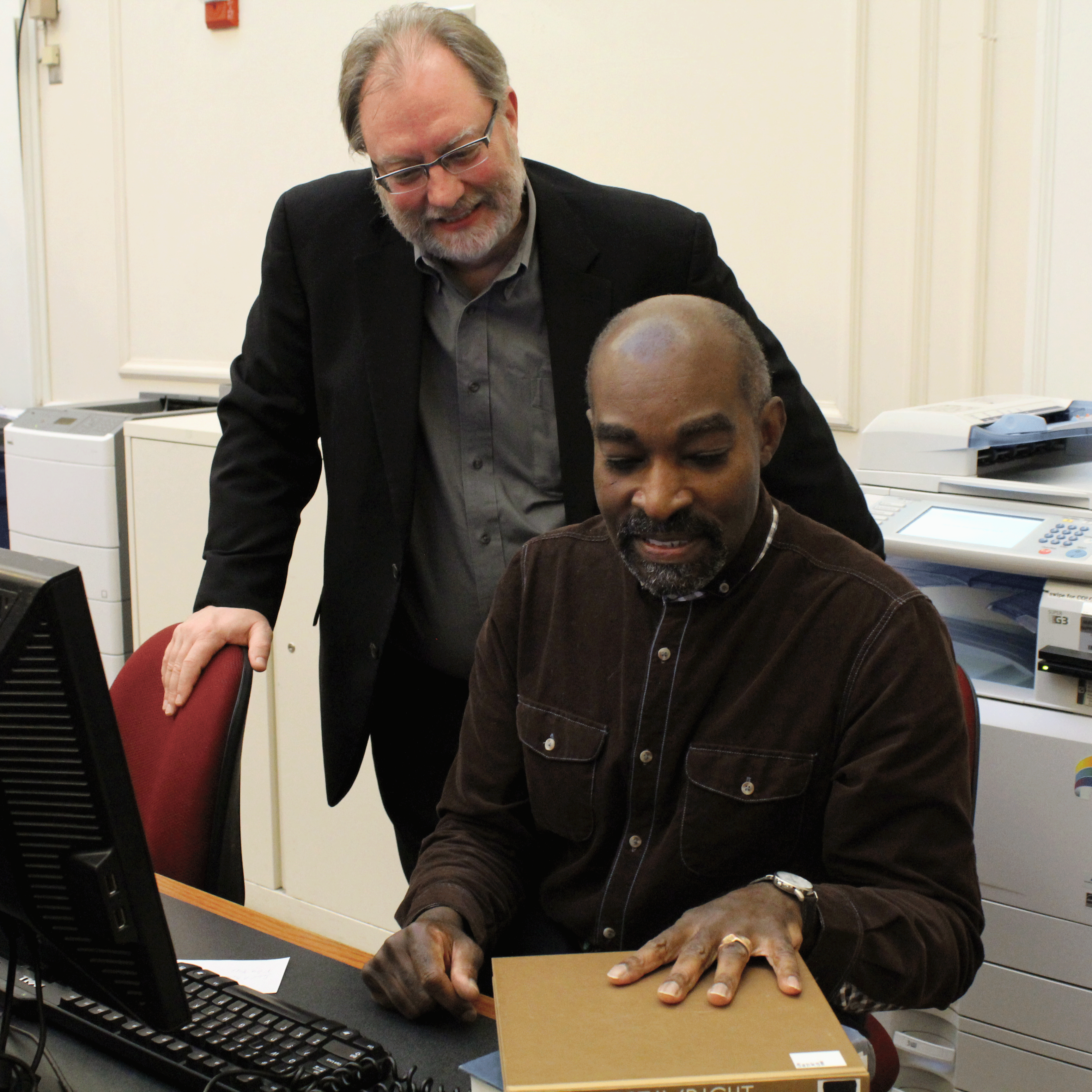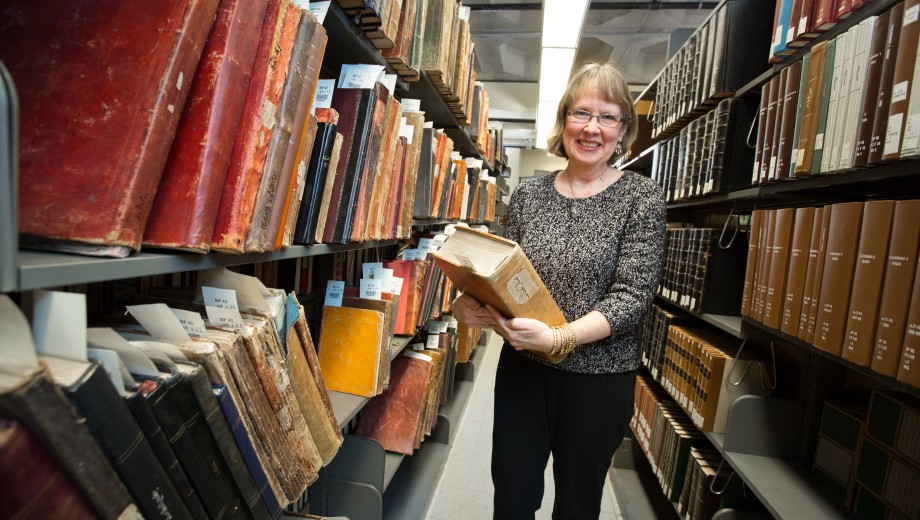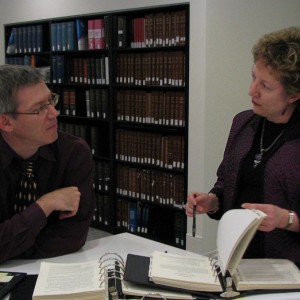Marlis Saleh, PhD’95, entered graduate school with the intention of working in academia. Today she does—just not quite in the way she intended. As bibliographer for Middle Eastern studies at the University of Chicago, Saleh, who also edits the Mamluk Studies Review, has drawn on her expertise to enhance the library’s collection. “I feel like being a librarian is another avenue to participating in the academic life,” she says. “I’m able to shape this wonderful collection and assist people.”
None of the other six alumni interviewed by Tableau planned on library careers, although some, like Saleh, worked at the University Library while at UChicago. But no matter how circuitous their paths, all found satisfying careers in library work, bolstered by the research skills they learned while completing their humanities degrees.
“I’d always enjoyed research,” says Carolyn Lundin, AM’83, senior manager of research services at the law firm Winston & Strawn, LLP. After completing a master’s degree in English Language and Literature, Lundin earned degrees in both library science and law, working in both fields before combining them at Winston & Strawn, where she has worked for 12 years. From San Francisco, she manages a small team of research librarians who remotely assist more than 900 attorneys located in 18 offices around the world; using an online shared research system, the librarians handle a wide variety of research requests and share the responsibility of answering urgent after-hours queries.
Lori Osborne, AM’85, also earned a master’s in English Language and Literature, which taught her “to think critically and think on my feet.” Ten years after taking a break to raise her family, she had moved into an old house in Evanston, which she researched at the Evanston History Center, an experience she enjoyed so much that she began volunteering there, helping to write house histories for house walks.
At the same time, she began researching the life of Frances Willard, the namesake of her sons’ school, which eventually inspired her to enroll at Loyola University for a master’s in public history. She worked at Northwestern University’s archives for two years, until a job opened up at the Evanston History Center.
“As an archivist, I’m the first researcher,” she says, “It’s fun to be in a community situation.”
 Plenty of alumni call working in libraries fun. Despite the stereotype of the stern librarian, finger pressed to lips, in reality library work is people work. Zhijia Shen, AM’86, PhD’97, came away from her experience as a student assistant in the Regenstein’s East Asian Collection impressed by how helpful and friendly the librarians were—not only to scholars and students but also to their families. “With children studying in the reading room, it was a very human, family-friendly job,” she says.
Plenty of alumni call working in libraries fun. Despite the stereotype of the stern librarian, finger pressed to lips, in reality library work is people work. Zhijia Shen, AM’86, PhD’97, came away from her experience as a student assistant in the Regenstein’s East Asian Collection impressed by how helpful and friendly the librarians were—not only to scholars and students but also to their families. “With children studying in the reading room, it was a very human, family-friendly job,” she says.
Today, as director of the East Asia Library at the University of Washington, Shen finds satisfaction in reaching out to her library’s local community. “We’re used to being in the ivory tower, focusing on our own faculty and students,” she says. In the past few years she’s helped with the university’s outreach efforts to Seattle’s large Chinese, Japanese, and Korean immigrant communities through library initiatives such as a Taiwanese and Chinese immigrant oral history project, community forums, and costumed Lunar New Year celebrations.
Books themselves can help to form community, says Matthew Heintzelman, AM’84, PhD’00, curator for the Austria/Germany Study Center at the Hill Museum & Manuscript Library at St. John’s University. “Certain books bring out the story of commonality more than others.” He cites his library’s large 500-year-old hymnals, written in inch-high letters so choir members could share them and read them from different rows. “They’re not just beautiful books,” Heintzelman says. “They represent a group of people seeing each other as they’re singing from this book, thinking, ‘This is my community.’ Those are my favorite books.”
 Although many librarians have favorite books or holdings, sometimes they need to find just the right book or resource to assist patrons. Lee Sorensen, AM’82, AM’85, the librarian for visual studies and dance at Duke University Libraries, once had to help a classics professor who couldn’t find an image of a carved lintel in a remote village in Turkey or Cyprus. Sorensen, who serves on the advisory board for Oxford University Press’s Dictionary of Art and also tests new image databases, directed him not to a museum archive or an institutional gallery, but to Flickr.
Although many librarians have favorite books or holdings, sometimes they need to find just the right book or resource to assist patrons. Lee Sorensen, AM’82, AM’85, the librarian for visual studies and dance at Duke University Libraries, once had to help a classics professor who couldn’t find an image of a carved lintel in a remote village in Turkey or Cyprus. Sorensen, who serves on the advisory board for Oxford University Press’s Dictionary of Art and also tests new image databases, directed him not to a museum archive or an institutional gallery, but to Flickr.
“It frustrates a lot of scholars because it’s the Wikipedia of images,” he says. “People can put images up there and they can call it whatever they want.” But because Flickr has so many tourist photos, Sorensen was able to enter a few key words and found the carved lintel right away—under a Creative Commons license to boot, so the professor could use it for free. “Just because a source is free,” Sorensen says, “doesn’t mean that you don’t need help finding it or it wouldn’t have a scholarly element.”
Thinking outside the sometimes narrow boundaries of academia is an important skill for these alumni. “People these days are asking different sorts of questions than academics were a generation or two ago,” says Bronwen Bledsoe, PhD’04, curator of the South Asia Collection at the Cornell University Library. “Libraries have failed to collect things that are now of great interest,” such as the earliest women’s magazines from India and Pakistan. During her annual buying trips to India, where she purchases materials ranging from religious pamphlets to pornography, she asks herself, “‘Would this material ever make it to the United States otherwise?’ If the answer is no, it’s a candidate.”
In asking and answering these questions, Bledsoe and other alumni agree that studying at the University of Chicago was excellent preparation for their library work.
“When I’m in the markets in Bombay trying to decide what to bring back,” Bledsoe says, “I hold the thing in my hand and try to figure out what it is, what is it trying to say, how it confirms or denies what we think we already know about India. Any book you pick up engages in so many different ways with the things that you learned in grad school, you heard from your friends, you heard from others on campus.”
This process of interrogating objects, texts, and ideas allows these alumni to continue in the academic life—while helping others do so as well.


